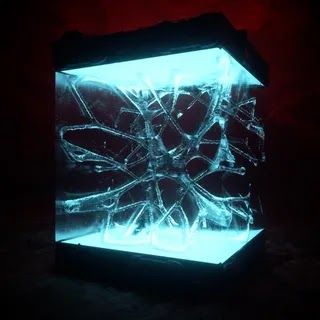On stage, the Bristol quartet combines a DJ’s instinct for pacing with a rock band’s penchant for volume. The group’s debut LP strikes a trickier balance between control and abandon.
A good DJ is a conductor of limbs. With the twist of a knob from their podium, they can sculpt the arrangement of bodies on the dancefloor like a theremin player plucking melodies from thin air. Bristol quartet SCALPING are in many respects a rock group, but they approach their concerts like nightclub overlords, designing their blistering sets like extended trance pieces. Self-described as “a live band playing industrial techno,” SCALPING combine the traditional tools of rock music with electronic processing to craft dimensional, steely sound circuits. Their method evokes the mechanics of a Transformer—an intricate machine springing from a mundane hunk of metal. On Void, their debut full-length, SCALPING channel a sense of precision into their songwriting, but they lose some of the intensity that makes their live shows so electrifying.
In the attempt to erase the boundaries between hard rock and techno, SCALPING detach their music from corporeal appearances. When they play, each member is visible only in silhouette. Guitarist Jamie Thomas, bassist James Rushforth, drummer Isaac Jones, and electronics mastermind Alex Hill are obscured on the dark stage, backlit by a screen flashing with visual artist Jason Baker’s cyborgian digital renderings. The faceless musicians disappear into their nonstop concerts, which they arrange as meticulously as DJ sets. SCALPING gradually build the tempo from 80 bpm to 140, then drop back down to 70 to achieve maximum kinetic response from the heaving crowd. As composers and, indirectly, choreographers, SCALPING are extremely calculated. “Nothing’s an accident,” the band has said, admitting that, like Rivers Cuomo, they write songs on spreadsheets.
SCALPING are devoted to minutiae, but more than anything, they want their music to be “extreme.” There are moments on Void that rattle and scorch—the glitchy, robotic pulse of “Over the Walls,” the blown-out bass on “Cloak & Dagger”—but the album often feels reined in. This is possibly due to the fact that SCALPING, a band so invested in their live sound, recorded the entire LP remotely during lockdown. Even they seem to have realized the limitations of that approach: “I don’t think we’ll ever make a record in this way again, without being in the same room at all,” Jones recently told NME.
Void’s tamest stretches, the loping “Desire” and the nu-metal indebted “Tether,” can be partly cured with volume; in fact the entire album should be played at full blast. But at moderate levels, “Desire”—a rigid network of sequenced bleeps, processed guitar, and subdued percussion—feels like a discarded theme from Daft Punk’s Tron: Legacy score. It is competent but not particularly innovative or extreme. With its searing guitars and pummeling beat, “Tether” is heftier, but the vocals from Oakland-based artist Daemon feel tacked on. His dreary, conversational delivery has a dampening effect, like a hand absorbing the clang from a crash cybmal. Rather than engulf the singer with their own grit and squall, SCALPING take the backseat on their own track, while Daemon sounds like he wandered over from another band.
If SCALPING craft their live shows as continuous arcs of noise, it makes you wonder why they didn’t replicate that tactic on Void. Some songs bleed into each other, but the album also has gaps between many of its tracks, making it feel like a more traditional rock album than an experiment in fusing genres. Two of its best cuts together feel like one evolving piece. Openers “Blood Club” and “Caller Unknown” are cinematic in their detail—buzzsaw guitars, dubbed-out drums, and metallic synths plunge you into a grimy tech noir, evoking the neon-lit back alleys of Ridley Scott’s Blade Runner. The two songs are wired together by souped-up screeching, one of the album’s most powerful, ear-shredding effects.
SCALPING snap back to this voltage on closer “Remain in Stasis,” which features Bristol’s Grove. Unlike Daemon’s dull, glued-on flow, Grove’s vocals are embedded in the mix like shining flecks in granite. Their voice glides through SCALPING’s gauntlet, dissolving under sizzling distortion and yielding to punishing, rubbery arpeggios. Here, SCALPING achieve perfect synergy between intensity and precision. With rigorous control, they choreograph chaos.



0 comments:
Post a Comment